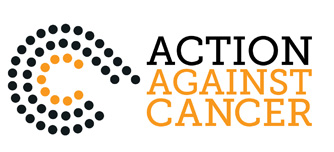Research Team
Action Against Cancer is proud to support many talented and dedicated scientists at Imperial College London, the University of Sussex, the University of Manchester and Anglia Ruskin University Cambridge. A sample of these hardworking scientists is shown here.
Professor Justin Stebbing
Professor of Biomedical Sciences, Consultant Oncologist
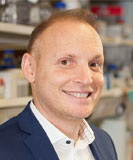 Action Against Cancer has supported Professor Justin Stebbing's research since the charity was established in 2011. He trained in medicine at Trinity College, University of Oxford, and continued his oncology career at The Johns Hopkins Hospital in the US, The Royal Marsden and St Bartholomew's Hospitals,
Imperial College
and Anglia Ruskin University Cambridge.
Action Against Cancer has supported Professor Justin Stebbing's research since the charity was established in 2011. He trained in medicine at Trinity College, University of Oxford, and continued his oncology career at The Johns Hopkins Hospital in the US, The Royal Marsden and St Bartholomew's Hospitals,
Imperial College
and Anglia Ruskin University Cambridge.
Professor Stebbing has published over 700 peer-reviewed papers in journals such as the Lancet, New England Journal, Blood, the Journal of Clinical Oncology and the Annals of Internal Medicine. His focus at Anglia Ruskin University Cambridge is on new therapies in cancer, and the systemic management of patients with solid malignancies. His laboratory work is concentrated on new druggable target discovery.
He is a Visiting Professor at
Imperial College , a Fellow of the Royal College of Physicians, the Royal College of Pathologists, and sits on the advisory Boards of a number of
international cancer committees. He was appointed the government's first oncology professor funded by the National Institute for Health Research
(NIHR) – the mechanism the government uses to fund research through the NHS. In 2016, Professor Stebbing was internationally recognised with his appointment as
co-Editor-in-Chief of Oncogene
(Nature Publishing Group's cancer journal) and election to the
American Society for Clinical Investigation.
Professor Georgios Giamas
Professor of Cancer Cell Signalling (Biochemistry), The University of Sussex
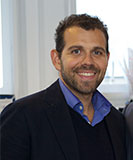 Professor Georgios Giamas studied at the National University of Athens in Greece and at the University of Ulm in Germany.
At Imperial College London he was awarded the Junior Research Fellowship and the following year was appointed Research Team Leader.
Professor Georgios Giamas studied at the National University of Athens in Greece and at the University of Ulm in Germany.
At Imperial College London he was awarded the Junior Research Fellowship and the following year was appointed Research Team Leader.
At the University of Sussex
since 2015, he is now a Professor of Cancer Cell Signalling in the department of Biochemistry and Biomedicine, while holding a Visiting Professor position at Imperial College.
Professor Giamas is also the Head of Department for Biochemistry and Biomedicine at the School of Life Sciences at the University of Sussex.
The Giamas laboratory focuses on the identification and elucidation of the role of proteins implicated in the progression of cancer and the development of novel therapeutic targets. Their translational research laboratory combines a variety of molecular, cellular and biochemical techniques, models and patients' specimens to study relevant pathways in cancer.
The research links ‘bench work to bedside’ and could have an enormous impact for patients while at the same time supporting the scientific community.
Dr Leandro Castellano
Associate Professor, RNA Biology (Biochemistry), The University of Sussex
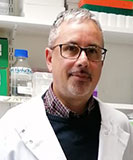 Dr Leandro Castellano studied in Italy at the Universities of Salento and La Sapienza in Rome. He was at Imperial College London for 12 years, and was appointed as
Team Leader at the Division of Surgery and Cancer.
Dr Leandro Castellano studied in Italy at the Universities of Salento and La Sapienza in Rome. He was at Imperial College London for 12 years, and was appointed as
Team Leader at the Division of Surgery and Cancer.
He has been at the University of Sussex
since 2019 where he is an Associate Professor in RNA Biology, and is the Designated Individual under the Human Tissue Act at the School of Life Sciences.
Dr Castellano also holds an honorary position at Imperial College London as a visiting Reader.
Dr Castellano’s group focuses on a class of molecule called noncoding RNA (ncRNA). They are working to identify ncRNAs and novel pathways involved in cancer growth or treatment resistance that could be targeted with new therapy.
In addition, they aim to establish whether these molecules could be used as biomarkers to assist earlier diagnosis and monitoring treatment response.
Dr Biancastella Cereser
Research Associate, Faculty of Medicine, Department of Surgery & Cancer, Imperial College London
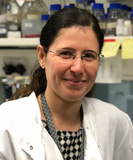 Dr Biancastella Cereser studied in Italy at the University of Padua and at the National Cancer Institute. She was at Queen Mary University of London for ten years,
where she developed particular expertise in the genetic analysis of epithelial premalignant diseases.
Dr Biancastella Cereser studied in Italy at the University of Padua and at the National Cancer Institute. She was at Queen Mary University of London for ten years,
where she developed particular expertise in the genetic analysis of epithelial premalignant diseases.
Dr Cereser is a Fellow of the Higher Education Academy. She joined Imperial College London in 2016,
where her research aims to understand the reasons why pregnancy can influence a woman’s risk to develop breast cancer.
In the medical community, it is known that giving birth at different ages is one of the risk factors for breast cancer:
having a child before the age of 24 is considered beneficial compared to having a child after 35, or even to not having a child at all.
Younger mothers in fact have less chance of being diagnosed with breast cancer in their older life compared to older mothers, or women without children.
But the phenomenon is more complex, as at any age, there is also a high chance of developing breast cancer during or after pregnancy.
To better understand the correlation between pregnancy, age and cancer,
Dr Cereser’s team analyse the DNA from cells of the healthy breast of both mothers and non-mothers of different ages to find DNA mutations.
Dr Nina Moderau
Research Associate, Faculty of Medicine, Department of Surgery & Cancer, Imperial College London
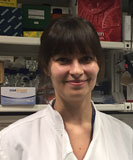 Dr Nina Moderau studied at the University of Bonn, Germany, and at Queen Mary University of London.
Dr Nina Moderau studied at the University of Bonn, Germany, and at Queen Mary University of London.
She has been at Imperial College London since 2018,
where she is responsible for a small team developing a 3D breast cancer model that will predict: cancer onset; growth of multiple clones at the same time;
and their interaction with each other. This ultimately will reveal which genes are co-operating with each other to promote cancer growth, and the development of metastasis.
